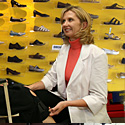Q: How do I know If my Shoes are the correct size?
A: The best way to know if you are wearing the correct size is to have your feet evaluated by a professional that has been trained to fit a shoe properly. Shoes should not be too tight so that your feet are cramped or so loose that your feet have no support. Our professionals are trained to assess a foot for not only length and width but also depth and know how to make accommodations for abnormalities. At Perfect Shoes Plus we know that different makes of shoes may fit differently. Our specialists also know that a huge percentage of the population can't just walk into any department store and find a suitable shoe. Stop in and we will give you the individualized attention your feet deserve.
Q: Do feet change?
A: Absolutely. There are many reasons over the course of a lifetime that influence how feet change. Weight gain and loss can effect the size and shape of your feet. Medical conditions from boney arthritic changes to swelling from various conditions alter feet. A normal change that occurs during ageing is that the tendons stretch making your actually foot lengthen and size change. As professionals telling someone their correct size when they are convinced they are still the size they were 20 years ago is challenging.
Q: Can the wrong fitting shoe actually cause foot problems?
A: It is true that foot problems can occur due to ill fitting shoes. For a good gait, balance and support of your entire skeletal structure, your shoes need to fit correctly, be supportive and be shock absorbent. Many foot problems are inherited and traumatic injuries are also responsible for a multitude of foot problems.
Q: I have heard that I should change shoes daily, is this true?
A: Your feet perspire daily and therefore you should let your shoes dry out. This will discourage any bacterial or fungal growth which could lead to serious foot problems. This is very important to foot health. Different shoes have different pressure points, trading off shoes on different days ensures that your feet don’t suffer the same constant pressure. Your shoes will have a longer lifespan and wear better if you alternate usage.
Q: Are all shoes equally sized?
A: They are not. A certain brand and or style may vary with respect to size. We see this frequently and deal with many European made shoes which have a different standard sizing chart than US sizes. Athletic shoes generally run half size smaller than a leather walking shoe. Work boots usually run longer than walking shoes. The manner is which s a shoe is constructed is actually quite complex. Many hands/divisions handle a pair of shoes before it makes it to the store. There can be subtle differences in each pair. Being size conscious is great but the ultimate test is in the fit and how well the shoe feels.
Q: Does it matter what time of day I shop for shoes?
A: That depends. If you are shopping for a casual lace up walking shoe or tennis shoe it may matter very little. However, if you are shopping for a snug fitting dress pump that will be worn predominantly in the evening you should shop later in the day. Feet tend to swell as the day goes on. Those cute high heels that fit great in the morning may be painful in the evening. If you have a medical condition in which you suffer moderate to severe edema (swelling) no matter what the type of shoe, you should be fit in the late afternoon.
Q: Is it possible to keep my heels from sliding forward in my shoes?
A: This is a common concern particularly for women who want to wear the dressier slip on shoes. As we get older we tend to lose our fatty tissue and fat pads around certain bones in the feet. We may also need more room in the toe box (the front part of the shoe) due to the tendons stretching. So therefore a shoe that fits properly in the front tends to slip in the heel area. There are a variety of products available on the market to remedy this problem. Sometimes it is as simple as adding an adhesive heel gripper. At Perfect Shoes Plus our professional pedorthists use materials unique to their field that offer greater advantages than off the shelf products and often solve the problem.
Q: Is it important that I wear socks with shoes?
A: It is very important that you wear socks with shoes. The type of sock chosen usually varies with the style of shoe. Nylon material such in pantyhose and trousers socks is typically worn with the dress shoe. Thicker more absorbent, shock absorbing socks are usually worn with casual shoes, sneakers, hiking or work boots. Socks offer many benefits ranging from keeping your feet warm and comfortable to preventing blisters due to friction from the surface of the shoe onto your skin. There are a wide variety of socks out on the market today to meet many needs of individuals. Perfect Shoes Plus offers Compression Hosiery for swelling and varicose veins. Our stock includes socks made with specialized material such as silver, copper and bamboo. These materials have been shown to decrease bacteria and fungi as well as increase circulation. We have 100% cotton socks which are hypoallergenic, comfortable, durable, moisture controlling and weatherproof. We even offer the popular and difficult to find Alpaca sock.
No matter what the footwear question, a good shoe store which offers variety, widths and individualized professional attention is the place to look.
